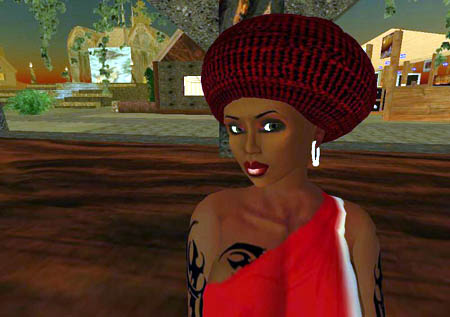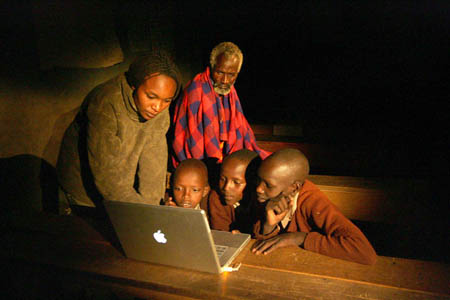Photo by kehinde_Cela
Glen Moody writes in his blog Open: “As Second Life – or its successor – moves closer to the center of online activity, the issue of bringing in developing nations and their related identities is one that will become ever more pressing if we are to avoid exacerbating the digital divide.”
There are already some interesting groups developing in SL, e.g., Indian Educators. But, still, as Moody notes, while SL allows people “to assume any identity they want, most of these turn out to be Caucasian (with a smattering of furries).” But, Second Life is on the move and groups, islands, and sims are emerging with many new identities.
Second Life is growing so fast that the strains of keeping up with its popularity have created some interesting challenges for “the real-world technology foundations of the make-believe world, and developer Linden Labs to stay on top of growth.” For a very interesting look at this, see the report, “Inside Second Life’s Data Centers,” in Information Week.
But, though Second Life is still in its infancy, it is clear that virtual worlds are a communications revolution not just an upgrade. Logging back into the Web after a session on Second Life always feels like I’m returning to a place where everyone is struggling with a communications challenge, i.e., forced to stand around with a sandwich board round their necks handing out leaflets in an effort to connect with other people. (Not that I don’t love doing this blog and maintaining a presence in other social networks. I even keep a My Space, despite the fact it has become like a giant user-generated audio visual list since friend adders came along. And, it would take a small staff to maintain it properly. But, hey, I like all that cool and uncool music that the people who show up everyday send me!)
But, Second Life offers a new opportunity to achieve what no government has managed to do, to bring peace and prosperity, through communication and trade on a digital continent without borders. And, as an added bonus, the user interface even has sharing and generosity built into it.
While millions of $ and Linden$ transactions are occurring in virtual space every week (SL website says US$ Spent Last 24h: $1,757,474), all newbies will eventually be delighted when someone passes them, with a single click, a vast inventory of goodies. I have been given countless items, clothing, bling, and scripts – including a “poofer” that allows your avatar to emit particles so you can announce your arrival with style with an expanding cloud of audio visual animations/business cards or whatever. You can also learn to make a poofer at Mystery Cove in a free class, and people do resell them. But, have care, unscrupulous people may resell things they have been given!
Moo Cards are now offering a new way to “take Second Life into your first life” with MiniCards featuring your avatar, crib or hangout, or, I will add, your favorite new sim for positive global development! See 3pointD for an example of a nice new set of SL Moo Cards.
The need for investment in education to alleviate the digital divide has been well publicized, thanks, in part, to celebrity activism. But, the call to support investment in Second Life in developing nations is relatively new. The advocacy for virtual worlds and positive global development in general, and Second Life in particular, by Mutumwa Mawere – a regular contributor to the virtual world in his column in Zim Daily puts a new perspective on crossing digital divides in Africa.
Mawere is also a member and advocate for myzimspace, myafrispace and myjozi. He writes: “there are many networking sites in the virtual space and it is not too late for Africans to invest in their own.”
And, he argues:
“Many have observed that the African American economy in the US is probably bigger than even South Africa, a country recognized as the engine of Africa with 47 million people and yet there is no visible connection between this economy and the rest of Africa.
Imagine everyone of us who are privileged to be connected could use our contacts and share them with our virtual friends in this Second Life and all of us can know each other through other people, how long will it take for us to create a social networking virtual space that we can collectively use to negotiate a better life for us and those connected to us.”
This photo featured recently in Apple Hot News is from the Build African Schools project pioneered by Retired tech executive Patrick O’Sullivan. 400 students attend the solar powered new school, in the Masai village of Oloolaimutia where they can work on the three new laptops.



March 22nd, 2007 at 10:18 pm
Fantastic article, but what are furries? (i.e…..’with a smattering of furries’)
May 4th, 2007 at 12:19 pm
Thank you! Your insight about digital divide issues has hit home! I am a South African on SL and we are actively promoting it amongst Africans. I am also blessed as a social investor and founding member of a not-for-gain company addressing divide issues. Hope to talk in-world: Alanagh Recreant